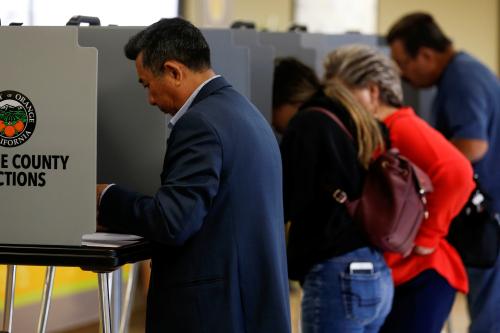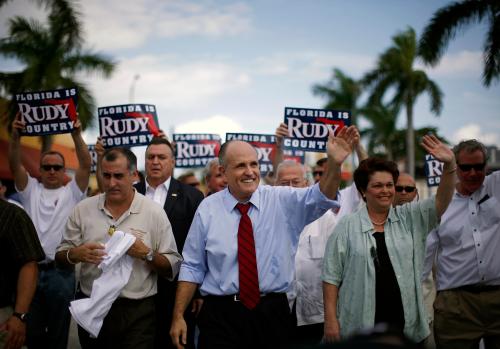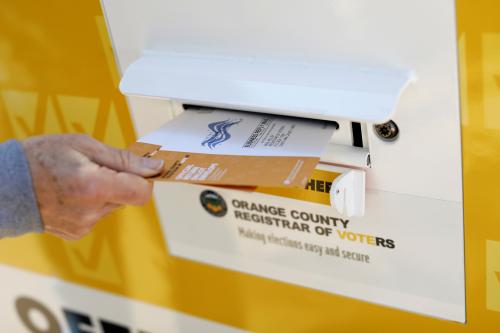When Democrats head to the polls on Super Tuesday, most of the media coverage will be directed toward the delegate-rich states of California and Texas. Yet with Senator Bernie Sanders’s landslide victory in Nevada and polling showing gains in South Carolina, his performance in states like Tennessee may be a more telling indicator of who Democrats will nominate in Milwaukee. While the demographics and history of the state should provide some comfort to the Biden campaign, were Sanders able to win in a state like Tennessee, even by a small margin, there would be few if any realistic paths forward for any of his more moderate competitors.
Tennessee is one of fourteen states holding their primary on Super Tuesday, and where 64 of the day’s 1,357 Democratic delegates will be allocated. While there have been no reliable public primary polls of Tennessee voters in recent months, results from Nevada and polls from South Carolina suggest that the primary will be a close contest between Vice President Biden and Senator Sanders, with self-funded candidates Mayor Bloomberg and Tom Steyer battling for third. Like South Carolina, Tennessee is a more conservative, more racially diverse, and less college-educated state in comparison to the nation as a whole. These demographic factors provide in-roads for Biden who has consistently polled best among older voters and African Americans.
More so than South Carolina, Tennessee Democrats have historically shown a preference for more mainstream nominees. While both Tennessee and South Carolina voted for Hillary Clinton over Sanders in his 2016 White House run, Tennessee Democrats chose Hillary Clinton over the insurgent Barack Obama in 2008 and eventual nominee John Kerry over the more populist John Edwards in 2004. Having won more endorsements from party officials than any of his opponents, this history of establishment support should also benefit the Biden campaign.
However, Biden’s underwhelming performances in Iowa and New Hampshire have left the campaign struggling to keep up financially with Sanders and the self-fundraising competitors, Mayor Mike Bloomberg and Tom Steyer. As a result, Biden has been absent from Tennessee’s airwaves, focusing his resources in South Carolina. According to FiveThirtyEight’s research on campaign advertising spending, Amy Klobuchar’s campaign has spent $3,200 in Tennessee, Sanders and Steyer have both spent around $200,000, while Bloomberg has spent $4.6 million. The unprecedented deluge of ads from the Bloomberg campaign has had the secondary effect of driving up the cost of advertising time, further driving his competitors from the market. Even Sanders’s impressive war chest would have difficulty competing with Bloomberg on the airwaves in Tennessee, let alone the remaining thirteen Super Tuesday states.
Further compounding these difficulties, each of the four major metropolitan areas, Nashville, Memphis, Knoxville, and Chattanooga, fall within separate media markets. Based off of 2016 presidential vote share, each of these markets constitutes 41%, 28%, 15%, and 9% of the Democratic electorate, respectively.[1] This makes each market a large portion of the Democratic electorate. Given the relatively few delegates at stake, the difficulty in advertising effectively, and the large number of other Super Tuesday contests, it should not be surprising if other candidates, such as Mayor Buttigieg, Senator Klobuchar, or Senator Warren redirect scarce resources elsewhere.
Finally, the crowded field of candidates is a critical dynamic at play both in Tennessee and primaries across the country. Were this contest to come down to Biden and Sanders, Biden would likely walk away with the majority of Tennessee’s 64 delegates. But with more than 7 candidates likely still on the ballot come Super Tuesday, the potential of “spoiler” candidates to affect the outcome is ever present. A recent Morning Consult poll found Bernie Sanders leading nationally with 32%, followed by Mayor Bloomberg at 19%, Vice President Biden at 18%, Mayor Buttigieg at 11%, Senator Warren at 11%, Senator Klobuchar at 4% and activist Tom Steyer at 3%. While a sizeable plurality selected the progressive Sanders, a majority prefers Biden, Bloomberg, Buttigieg, or Klobuchar—the four viable establishment candidates. Given that candidates must win 15% of the vote in a given congressional district to win delegates, this could leave as much as 31% of primary voters casting ballots for non-viable candidates. One of the biggest unknowns heading into Super Tuesday is whether the results of the South Carolina primary have any effect on the field of candidates.
Most polling suggests Senator Sanders will do well in blue states like California and Massachusetts. If he is able pull even or prevail in states like Tennessee, there would be few paths forward for most if not all of the other Democratic candidates. If, instead, one of the more moderate Democratic competitors is able to do well in states like Tennessee, this could provide them with the needed pressure to clear the field of other more establishment nominees.
[1] The remaining 7% of Democratic voters are scattered throughout four other periphery markets.








Commentary
With little polling and big ad spending, what to watch in Tennessee on Super Tuesday
February 28, 2020